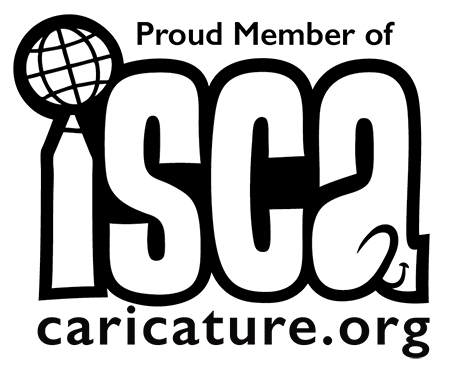Sunday Mailbag

Q: I know from reading your blog that a caricaturist can use caricatures of celebrities to display their work, but cannot sell them due to the celebrity “owning” their likeness, and that it is not worth the hassle of getting into legal trouble doing it. Having said that, an artist sold a painting of a nude Bea Arthur a few months back- Don’t the same rules apply? Or are exemptions made for “fine” art?
A: I’d like to preface my comments below by saying I am not a lawyer and this is not meant to substitute for real legal advice… I’m just a guy who has done a fair amount of research on this over the years. To a great extent, interpretation of the law boils down to how you THINK a specific set of circumstances will be ruled on by the courts. No one really knows until it’s before a court. I certainly don’t. I’m mostly speculating here…
That said, an original piece of art is almost always going to be an exception to the right of publicity, as long as it’s an original work and a one-of-a-kind thing. Putting up a website advertising you do original paintings of Tiger Woods is different than doing a series of golf paintings, one or two of which have Tiger in them. Soliciting original art commissions of a specific subject is much more like selling a product, even if they are original paintings. A one-of-a-kind painting is going to be nearly bullet-proof against a right of publicity lawsuit… especially if the artist does something stylistically where the art itself and not the subject matter could be the attraction for the buyer. If your example of the naked Bea Arthur painting was one of a series of naked paintings of celebrities no one would ever want to see naked, that would be an artistic theme and I don’t think any court would hold them in violation of a single celebrity’s right of publicity. If that same artist did 200 nude Bea Arthur paintings and opened up a “Naked Bea” kiosk at the local mall, Bea’s estate might have a case.
There are extenuating circumstances, of course. Parody is generally considered an exemption from RoP and copyright claims as long as it’s clearly making fun of the subject and/or the industry he/she is known to be a part of. The Bea Arthur painting could be considered a parody or social commentary on the ills of celebrity vanity or our culture’s instance on perfection of the looks and body of many actors. Parody is a first amendment right. Given that, I could probably sell prints of this:

… and get away with it since it clearly makes fun of Tiger’s shattered public image. This actually IS a caricature sample from one of the walls at one of my theme park locations, but I would still not sell it. Why? Well, for starters it’s not a fine art print, and as I have said here before the method of production of this kind of thing really does make a difference for the courts. An original painting, or a limited edition print series, is considered “fine art” by the courts and therefore an acceptable form of free speech. T-shirts, coffee mugs, posters and the like are considered “products” and not accepted vehicles of free speech, and thus the “parody” defense is not applicable. But the reality is that I just don’t think it would be worth selling a handful of pictures of Tiger or anybody else when the legal right to do so is somewhat in doubt. It would cost me more to defend that right in court than I’d ever make from selling the caricature, so why even try?
Thanks to Chelsey White for the question. If you have a question you want answered for the mailbag about cartooning, illustration, MAD Magazine, caricature or similar, e-mail me and I’ll try and answer it here!
Comments
Tom's Newsletter!
Sign up for Tom's FREE newsletter:
Categories
- Classic Rock Sketch Series (60)
- Daily Coronacature (146)
- Freelancing (173)
- General (1,658)
- Illustration Throwback Thursday (107)
- It's All Geek to Me! (53)
- Just Because… (1)
- MAD Magazine (918)
- Mailbag (691)
- Monday MADness (454)
- News (1,044)
- On the Drawing Board (160)
- Presidential Caricatures (47)
- Sketch O'The Week (847)
- Stuff from my Studio (21)
- Surf's Up Dept. (29)
- Tales from the Theme Park (17)
- Tom's MADness! (149)
- Tutorials (18)
- Wall of Shame (17)










Good clarification, Tom. I got into trouble with the U.S. Government for using Smokey the Bear in a cartoons; the issue was that I was selling products featuring the image and that Smokey, although distorted, was recognizable as Smokey. Too bad, I was actually getting some income from the design.
That is copyright, not right of publicity, but a similar issue.
Things I learn: there is a special law protecting “Smokey The Bear”
http://www.gpo.gov/fdsys/pkg/STATUTE-66/pdf/STATUTE-66-Pg92.pdf
I still don’t know how guys get away with selling trademarked images/characters on tshirts at cons.
That is a Riddler wrapped around Ms. Mystery inside Enigma Force…
[…] MAD Magazine cartoonist Tom Richmond takes on the following question in a “I’m not a laywer, but a cartoonist…: […]